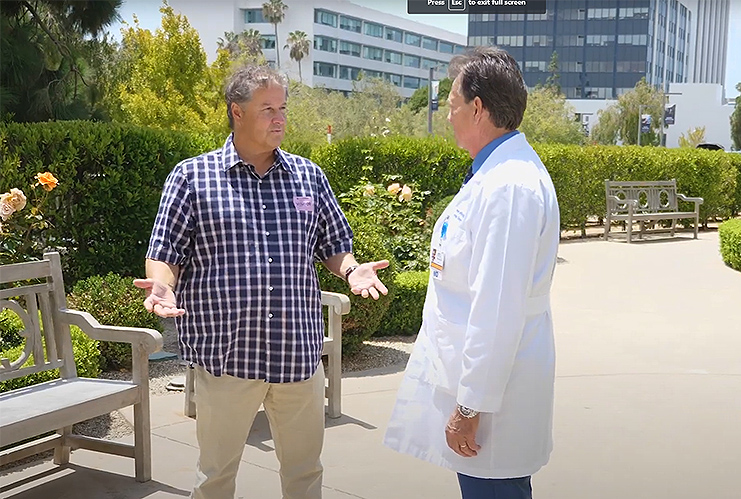
Hear from Dan’s care team as they dive in-depth regarding his cancer treatment in a candid discussion.

At a closer glance:
Did Dan have stage 4 metastatic prostate cancer?
Dan Garr was referred to Dr. Pzemslaw Twardowski and Dr. Timothy Wilson with a possible metastatic cancer due to high PSA levels, with an intermediate risk for prostate cancer. Dan’s scans showed an abnormality in his left 4th rib, an indication cancer could have spread outside its primary location and metastasized. According to Dr. Twardowski, because there was a “lack of known trauma to the [rib] area and explanation for how it could have spread to the bone, and an inability to biopsy the [rib] area,” easily, they could not conclusively call it metastatic cancer. Though the rib lesion was lighting up on the scans, which was very concerning, they had to think of other ways to treat the prostate cancer while taking Dan’s desired method of treatment into consideration.
A possible metastasis in the Rib
It is extremely difficult to biopsy a rib and Dan’s care team was weary of overtreating him with drugs, such as radiation, hormone therapy, or chemotherapy, especially if the cancer was found in only one location. According to Dr. Twardowski, the PSA blood test is the indicator, of whether to start patients on chemotherapy, hormone therapy, or radiation.
“It would be in the past, with positive lymph nodes, or positive margins, with seminal vesicles involved, and if outside the prostate, we would have recommended immediate hormone therapy and maybe even radiation. Now we know it is safe to wait and to do PSA levels,” Dr. Twardowski remarks.
Prostatectomy
“There is never any benefit to convince [a patient] of doing surgery, for the surgeon or the patient. Some people feel better when the primary, prostate, tumor is out. [Dan] happens to be one of those guys who were very comfortable with surgery… It is a big decision to have a prostatectomy,” says Dr. Wilson in the video.
If Dan indeed had metastatic cancer to his rib, a PSA reading would have persisted after his prostatectomy, indicating the same cancer is still in the body. This would have triggered the need for additional treatment, conclusively diagnosing Dan with stage 4 metastatic prostate cancer.
A False Positive
After Dan’s surgery, Dr. Twardowski, Dan’s medical oncologist remarked, “[Dan]’s PSA level became undetectable—below the level of detection. This speaks to the fact that the rib lesion is probably not prostate cancer…then he had a second PSA come back, also undetectable. This is making us feel optimistic that it is not a metastatic disease, but rather, a false positive. At this point, we are not planning additional drug therapy, but now we will follow him very closely.”
Dan’s swim across the Mediterranean Sea
“He told me right before the surgery he was going to swim 23 kilometers. I told him, ‘No, you cannot swim two weeks after surgery—you can ride in the boat.’ Then he sent me a video of him swimming off the coast of Tuscany to the island of Elba…his bladder control is good,” says a smiling Dr. Wilson.
Taking the prostate out does not change [men] as a sexual person.
Myths surrounding prostatectomy
Taking the prostate out:
- does not change your sexual preferences
- does not affect sex drive
- does not change who you are as a person, or as a sexual person,
- does not change orientation
- does not affect testosterone levels
- does not affect one’s ability to feel sensation in the penis
- does not affect one’s ability to fully feel/have an orgasm.
ADDITIONAL INFO: Learn more about Robotic Prostate Cancer Surgery.
[Prostatectomies] do cause erectile dysfunction or rigidity during arousal…85 to 90 percent [of men] will have a return to natural intercourse within a year. It has a slower recovery than urinary incontinence.”
– Timothy Wilson, MD
Complications of a prostatectomy
Blood loss, anesthesia, the surgery itself, recovery, urinary incontinence (UI), and Erectile Dysfunction (ED), are all complications that could arise after radical prostatectomy.
Urinary Incontinence (UI) from Prostatectomy
With advances in medicine, surgery outcomes for a prostatectomy are remarkedly better. “It used to be men would go on for months, or never recovery from urinary incontinence; 15 -20 percent. Now, it is 1 percent of men who might need subsequent surgery. It is not to say it may take some time to recover from UI; within 3 months to 1 year to fully recover,” Dr. Wilson explains.
The goal is to minimize the time during which they are worst while they are recovering with erectile dysfunction and incontinence.
Erectile Dysfunction (ED) from Prostatectomy
The cause of erectile dysfunction from a prostatectomy occurs from damaging the nerves, ‘[nerves] that sit along the side of the base of the prostate,” remarks Dr. Wilson. After international comparisons from multiple different surgical techniques, qualified surgeons can minimize damage to these nerves so that there is almost 100 percent recovery from ED after a prostatectomy. However, it takes more time to recover from ED than UI.
Generic Viagra or Generic Cialis, “seems to help with recovery of the nerves, as shown in three randomized studies—to keep the penis healthy while the nerves are waking up,” Dr. Wilson Continues.
VIDEO: Listen to Dan Garr talk about his cancer journey and swim across the Mediterranean.



